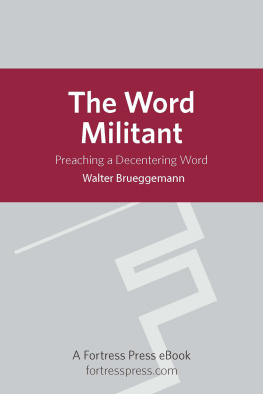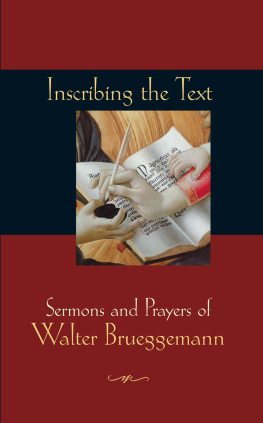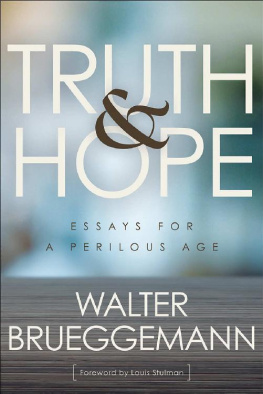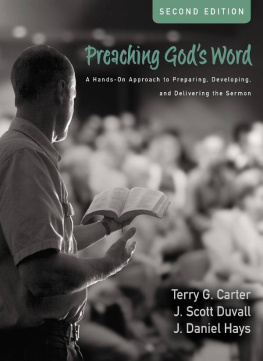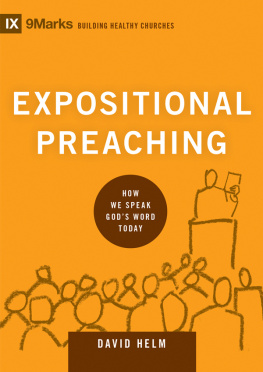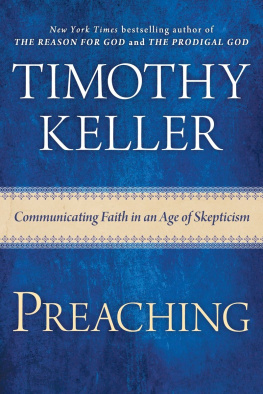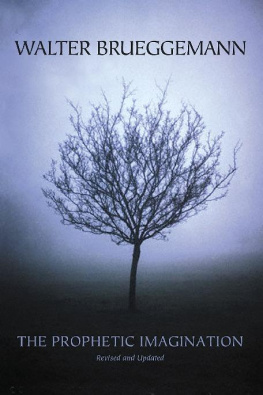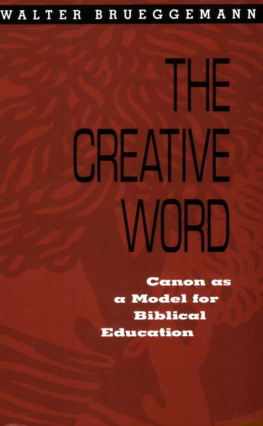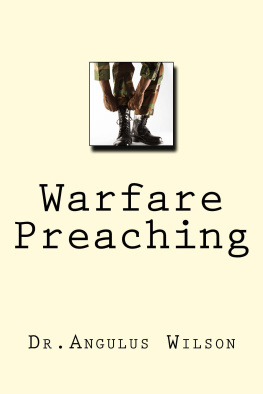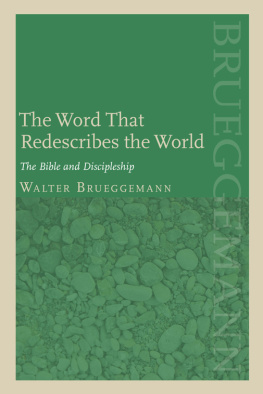
THE WORD MILITANT
Preaching a Decentering Word
WALTER BRUEGGEMANN
Fortress Press
Minneapolis
THE WORD MILITANT
Preaching a Decentering Word
First Fortress Press paperback edition copyright 2010 Fortress Press, an imprint of Augsburg Fortress. All rights reserved. Except for brief quotations in critical articles or reviews, no part of this book may be reproduced in any manner without prior written permission from the publisher. Visit http://www.augsburgfortress.org/copyrights/ or write to Permissions, Augsburg Fortress, Box 1209, Minneapolis, MN 55440.
Scripture passages are from the New Revised Standard Version of the Bible, copyright 1989 National Council of the Churches of Christ in the USA. Used by permission. All rights reserved.
Cover design: Brad Norr Design
Book design and typesetting: The HK Scriptorium, Inc.
ISBN 978-0-8006-9765-5
The Library of Congress cataloged the hardcover edition as follows:
eISBN 978-1-4514-1977-1
Library of Congress Cataloging-in-Publication Data
Brueggemann, Walter.
The word militant : preaching a decentering word / Walter Brueggemann.
p. cm.
Includes bibliographical references and index.
ISBN 978-0-8006-6277-6
1. Preaching. I. Title.
BV4211.3.B78 2007
251 2007033970
Contents
William H. Willimon
In Gratitude to My Classmates of Fifty Years Ago
Eden Theological Seminary
Class of 58

T hank you for your help in the current preaching emergency. That was how Walt ended a recent letter to me. Preaching emergency? It was a characteristic Brueggemannism. I was unaware that we were in a homiletic emergency until Walt named it thus. With Walt, that which I might circumspectly describe as malaise, a temporary problem to be dispassionately considered, becomes heated, confrontational, demandingly urgent actionpreaching emergency.
Walt has been heating up things for us preachers for over three decades now. I dedicated my Peculiar Speech: Preaching to the Unbaptized (Eerdmans, 1992) to him, though I did not say why. Now I have the opportunity. I owe Walt a great debt. The best that this poor preacher has preached in the last thirty years, I got from either Brueggemann or Barth. (Barth appears to be about the only contemporary theologian for whom Walt has much regardyet another endearing Brueggemannian attribute.) Walt helped make an essentially cowardly, hesitant, people-pleasing preacher like me more militant. My best homiletical frontal assaults, sneak attacks, flanking movements, offensive and defensive maneuvers were done under Walts direction.
I first encountered Walt in his early The Creative Word (Fortress, 1982). His was a voice any preacher would lovestrong, assertive, bold, and authoritative, but still full of humor, particularly ironic humor, mixed with militancy. I had always despised wisdom literature and yawned at Leviticus until Walt foisted them upon me in The Creative Word.
At the conclusion of his lectures (which were eventually published as Finally Comes the Poet [Fortress, 1989]) a preacher next to me exclaimed, Thats the grandest testimony to the joy of being a preacher I ever heard! In near despair of a forlorn inner-city parish in South Carolina, when I was about to throw in the towel and quit, a reading of Walts commentary on Jeremiah made it impossible for me to resign from preaching. Once one was called by God to testify, according to Walt and his favorite prophet, one had better stand up and deliver, measurable results be damned. They may kill you for what God makes you say, but what a way to go.
In the pulpit, Walt speaks in a strong, visceral style, clutching the pulpit as if it were a raft in a storm (the preacher in Moby Dick comes to mind), at times assaulting the congregation, sparring with them, mocking them, yet congratulating them for having the guts to be part of Israels and the churchs conversations with a living, demanding, and loving God. Walts is the Word made militant. One Sunday, after Walt had thundered from the pulpit of Duke Chapel as a visiting preacher (his sermon full of pathos and grandeurDavids lament for Absalom), a student referred to Walts style as that of the raging bull. I thought he had Walt just right. Every time Brueggemann speaks, a congregation knows that serious matters will be wrestled into their hearing, but always with a beguiling playfulness. Every sermon Ive heard him preach is a model of obedience to the text, even at the cost of his listeners. His theological expectation for the power of the spoken gospel word is extravagant and unconstrained by contemporary intellectual limitations.
In these essays you will find that Walt wastes no time in taking a text and charging into the heart of enemy territory, in grabbing the readers attention and getting down to business. I think that he is a pacifist Christian, but you couldnt tell it from the tone of his writing. He shows that he has read just about everything, that he is in conversation and in argument with a dazzling range of partners from dozens of unlikely disciplines, and that the biblical word can mix it up with the best of them. I took the better part of two full days to work through his magisterial An Introduction to the Theology of the Old Testament: The Canon and Christian Imagination (2003). After that mid-career reading, my biblical interpretation was forever changed. Take that, all you aging defenders of the historical-critical method.
For all these reasons and more, we preachers and hermeneuts can rejoice at this compilation of some of the best of Brueggemann on preaching. We are the ones who regularly ask, as anxious Zedekiah queried preacher Jeremiah, Is there a word from the L ORD ? (Jer. 37:17). Walt, backed up by the prophets, exuberantly responds with pushy, biblically induced testimony that is more than merely personal generativity from his fertile mind. Yes, there is a word from the L ORD , and encounters with it will not leave you unscathed. He knows that our homiletical crisis is due to theological factors rather than rhetorical ones. Through a lifetime of serious engagement with the biblical text, Walt has never lost a childlike surprise and adolescent delight at whats to be discovered in Scripture. While he reads widely and is in knowledgeable, respectful conversation with a wide range of scholars, Walt always privileges, prejudices the biblical text over any other. His reports of his skirmishes with Scripture never fail to fuel and to stoke the imaginations of us preachers. He thus provokes an emergency and shames an accommodated, culture-bound, tamed, therapeutic church with his fecund prophetic re-descriptions and creative transpositions that speak the biblical word into our time and place. Unintimidated by the disestablishment of the American Protestant church, he always hears something for us to say that the world is literally dying to hear. Walt thus gives testimony to a ceaselessly interesting God who speaks, reveals, and discloses, a God who is accurately known only through Gods Word, only through a gaggle of Spirit-filled, evangelical preachers whom the Word has made militant.
Next page
